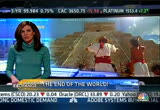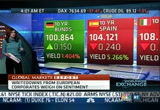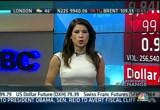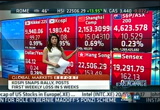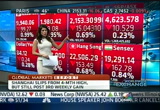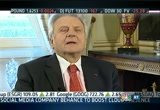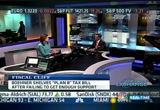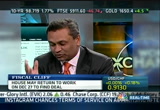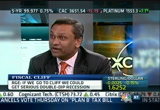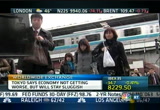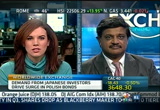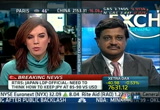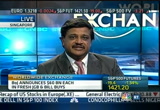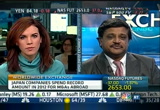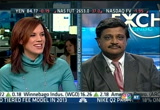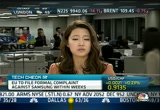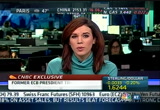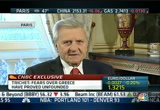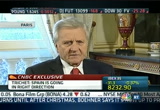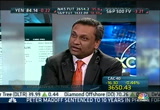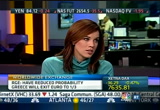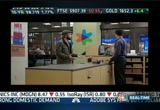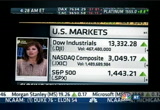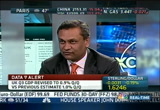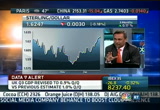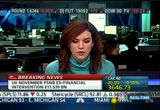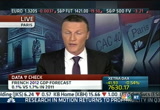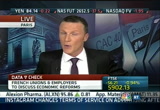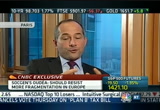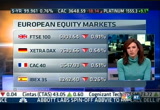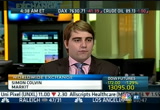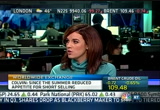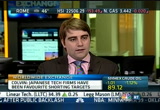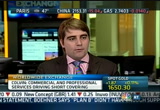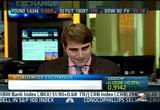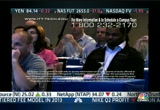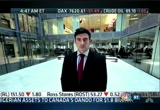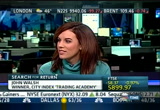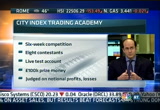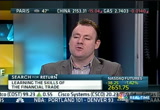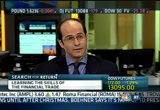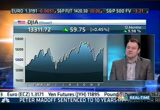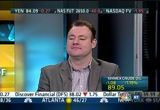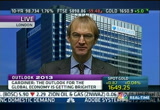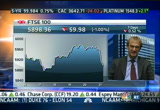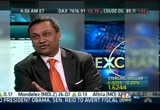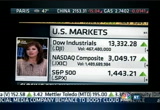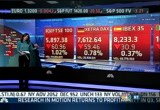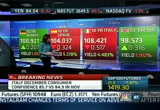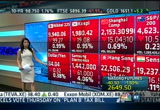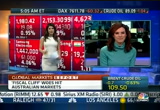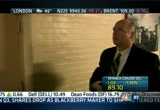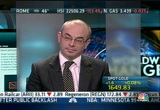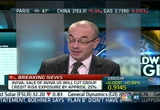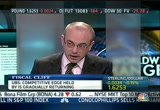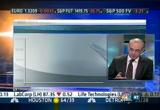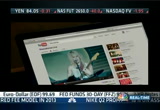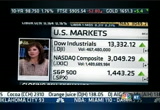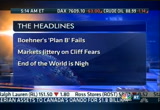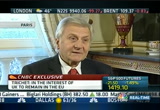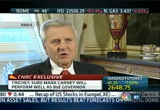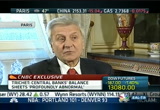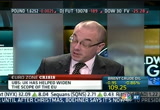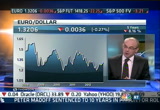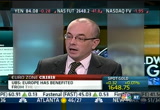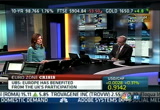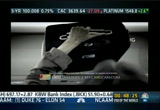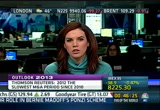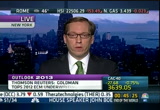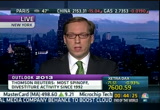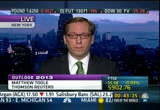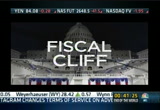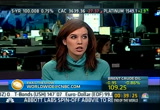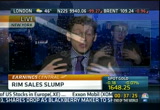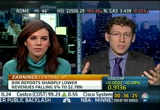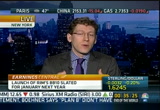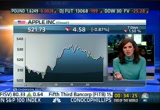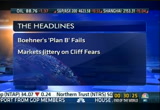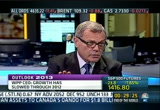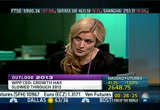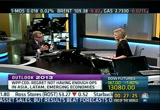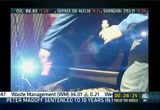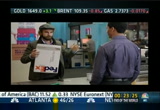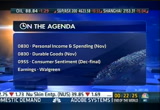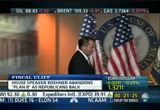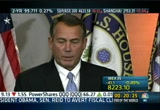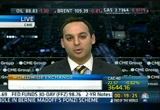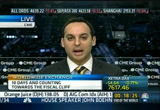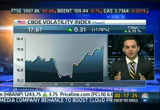tv Worldwide Exchange CNBC December 21, 2012 4:00am-6:00am EST
4:00 am
4:01 am
house as house speaker john boehner's plan fails with just ten days until the fiscal cliff deadline. markets trading lower on that news. arcelar and skanska trading down. the mayan calendar counts down to that cataclysmic conclusion. >> announcer: you're watching "worldwide exchange," bringing you business news from around the globe. >> let's take a look at how markets are trading. stoxx europe 600 is down about .6% this morning, this after word that house speaker john boehner's plan b didn't come to a vote last night. he couldn't get them in place apparently. we'll have plenty more on the impact of that on the program. not much here, we see decliners well outpacing advancers. the ftse mib in italy down .6%.
4:02 am
the ibex down .4%. the dax selling off .5% lower than yesterday. same goes for the ft. if it is, down .8%. 5909. how quickly we've gone from talking about 6,000 to talking about 5,900. the german bund rallying. same goes for the uk. we're seeing a rotation into safety, out of risk and out of spain and italy. about 4.5% for italy. thin trading in markets is exacerbating the move that we're seeing as we approach the year. today, the austy dollar is weaker against the u.s. dollar by about .4%. proxy there for global growth prospects. the dollar/yen is weaker by about .25%. this as markets digest the news out of the boj and gauge whether they'll be successful in boosting inflation ultimately.
4:03 am
the euro/dollar, 1.3221. so for trading in asia, just how japan, china and the rest have been affected by fiscal cliff news, diedra morris is join onning us with plenty more. hi. >> hey, kelly. it was a bit of a rude awaking. a lot of these indexes were on their way to gains and then we had the fiscal cliff setback. we had news that john boehner's plan b failed. this all turned red and this is where we ended. the nikkei 225 coming back from that huge rally that we have seen over the last five weeks shedding 1%. the exporters hurt here because the dollar/yen was lower. it has regained some ground in the last few hours or so. the kospi shedding about 1%. blame politicians in the u.s. and blame heavyweight samsung. this accounts for some 20% of
4:04 am
market value on the kospi index. down 4%. that hurt the broader markets. this is, of course, because eu regulators are poised to excuse samsung of breaking competition rules and filing competition patent lawsuits against samsung. greater chinese markets, shanghai more isolated from global happenings and fiscal cliff negotiations. really, it's been a lot of general volatility here. i've been talking about this all week and the index hasn't moved much. we did see a large run up since the beginning of december, some 9%. however, i have my eye on the year-to-date losses. they are still holding around 2%. and if the shanghai comp and this year with loss, it's a three-year bear market and eats a lack of trust. the retailers have yet to buy into this market once again because trust is so low. there are, keep in mind, 72
4:05 am
million retail investors. those are the cab driver retail investo investors. fiscal cliff worries certainly played into the market here. down .7%. the culprit was mainland banks. they were weak on both exchanges. so the likes of icbc bank of china, ccb ag bank were all weak on liquidity concerns. the sensex in india down .8%. kelly, keep in mind, that market is up nearly 25% year-to-date. back to you. >> okay. diedra, great information there. and as the clock ticks down to the end of the world, we'll cross live to the sleepy french town where aliens are waiting to
4:06 am
protect a few human souls. and find out how city index has taken a group of individuals with no financial market experience and turned them into successful traders. we'll hear from the winner of this year's competition who is a trainee taxi driver. we'll hear from foreign central european bank chief jean-claude trichet. he spoke with stefan pedrazzi about whether he believes there are any reasons to be optimistic about greece. and whether volatility triggered by uncertainty over the fiscal cliff should be hear to stay. the fiscal cliff seems to be here to stay, at least. house speaker john boehner has scrapped the deal on plan b. boehner conceded last night he didn't have enough support from republicans to pass the bill which would raise taxes on households making more than $1 is million a year. the house is now in recess until
4:07 am
the end of the year. the white house says the president's main priority now is to ensure taxes goes go up for 98% of americans and 97% of small businesses. for more on the tax, we're joined. talk about the cliff. you wake up to the news this morning. what do you make of it? what do you do now? >> i guess what's happening is there is more idealogical battling going on in the republican party than maybe was obvious a little while ago. our baseline view is they will strike a deal either down to the wire or early next year. growth next year will be quite weak. it has to be said that there is a tail risk that is substantial. maybe 25%, a little more than that. the idealogical battle about the future shape of the country
4:08 am
really does drive us over part of the cliff, takes us toward the debt ceiling. >> that's the other piece of this that i think is being overlooked. but if you think back to what happened last summer, not only does it help us, but part of the reason why the sequestration that we're facing is part of this issue is because of the debt ceiling. it's almost like the dog chasing its tail. and the debt ceiling issue hasn't gotten the focus this time of year that it really should. >> ultimately, you know, there's not going to be a default, right? that would almost be treasonist. you can't question the validity of the public debt. so the risk is you go up to the -- you know, you go over the fiscal cliff, have this big debate and then you have to start shutting down parts of federal spending in order to keep the debt constant. then, if we really have that, that is a severe double dip situation and the entire planet would suffer because the u.s. is the world's largest importer,
4:09 am
right? i think what's at stake here is one wing of the republican party, called the tea party, is digging in its heels because it doesn't want a middle class entitlement kind of society like we have here in western europe. it was a minimalist safety net, right? and both the right, the center right, george w. bush and the left, if you want to call it that, the center left in the united states, obama has given away more middle class entitlements, the unfunded medicare stuff, things like that. it's partly about the fiscal cliff. it's more about what you guys call the fiscal bliss. >> we're hoping some deal can be struck. it shouldn't be overlooked that what is happening is what is happening in the national conversation about just how much ground americans want to give. you know, how much they want a model so much of what you're talking about in europe.
4:10 am
these issues can't be raised separate from talking about, for example, the deficit, separate from talking about the economy because they really all do come together. >> right. and i think that was understood in constructing the constraints in the fiscal cliff because everybody has to give up something. if we go over the cliff, right? so there's across the board sequestration in defense and all kind of things the right doesn't want, either. furthermore, the revenue side is quite heavy in the fiscal cliff. that's why we think in the end they're going to reach a deal, right? republicans do have quite a lot to lose in the short-term. they're not going to starve the beast, they're going to beat it. >> feed the beast. arnab is with us. today is the december 21st, it marks the conclusion of the 500 year long mayan calendar. but whether we're face ago spiritual change or a catastrophic event depends on
4:11 am
who you listen to. there's been pan ek buying of candles in china and canned goods in the u.s. a mountain n peer niece, rumors have spread aliens will rescue any human gathered there because of the upside down mountain that exists in this town. they can't quite explain it. now we can take a look at just how long we have until the end of the year with our end of the world countdown clock. apparently, arnab, this is extremely important information. apparently the world is going to end at 111:111 london time. that dpifs us just enough time to finish "worldwide exchange." >> i won't have to cancel my lunch. >> what do you want the new world to look like after it all ends? get in touch with us here,
4:12 am
e-mail us, worldwide@cnbc.com. tweet us. joe gill has decided not to slap a downgrade on the country's growth for the first time in four months. japan looks set to recover from its fourth remember session in 12 years on a pick up in industrial demand. still, it did warn that japan's economic environment remains week. the bank of japan also says foreign ownership of government bonds has risen to a record high at the end of september. this is important. the data suggests japan is growing more reliance on overseas investors to fund the nation's massive debt. reuters is reporting that heavy demand from japanese investors has helped increase foreign holding of polish sovereign bonds. asian investors are apparently attracted to poland's better returns and less risky economy. for more on this, we're joined by rajig beswos.
4:13 am
i just want to start here on this point about japanese investors buying polish debt. you can understand why a japanese investor is looking for yields. is there any reason to be concerned about their growing link through ties, i should say, the exposure to what's happening in a country like poland? >> i think we've seen for over a decade now that japanese investors are looking to oversea sovereign debt and other forms of investment abroad including money market funds and country that's look attractive. at the moment, poland still looks very attractive in the eu landscape. it's one of the more strongly growing economies and in rel ofly good shape. so i think that makes sense in terms of overall landscape if you're looking for yield. and that's the problem that japanese investors confront is they have no yield at home and the savers, the pensioners and so on are looking for return
4:14 am
elsewhere. a popular option historically has been australian and new zealand money market and debt, as well. >> well, perhaps the broader point, too, is that you've got this long stand iing portion of japanese debt held internally. but if more japanese investors are putting their money overseas and if more overseas investors are holding japanese des, that is potentially important. >> i think japan at the moment, it's very worrying the direction that they're heading in terms of their rising government debt. it's already at very high levels. jgb yields are very low and that's been able to fund that for some years now. but as you rightly point out, the ability of domestic investors to fund that debt is going to diminish overtime as the population in japan ages and as they'ir funding requirements increase. and the latest negative turn in
4:15 am
events on the debt score is that the likelihood of the doubling of the consumption tax in japan which had been agreed in principal now looks increasingly unlikely now that the ldp has won and they had always been skeptical about this in any case. and given that japan is now in recession, the likelihood of not going through as scheduled is becoming -- >> that's a great point. >> and that's going to increase the fiscal debt. >> and people were looking for a spur in domestic spending because this tax hike was coming. if that's not going to happen, we shouldn't expect that boost. where does that leave actually the outlook for growth here? >> i think there will have to be some near term fiscal growth next year. japan is heading towards a debt crisis unless it takes some remedial action within the next two or three years.
4:16 am
it's not imminent because it's domestically funded still to a large extent. but i think that, you know, you're heading towards a crisis in japan on the debt story unless some actions are taken. and unless it looks like they'll take the key step necessary which is doubling the consumption tax rate, if that doesn't happen as scheduled and they're heading towards great problems on their fiscal deficit and on their government debt. >> i just want to get a quick thought here from arnab. >> japan is a high level equilibrium trap. they're subtracking from it because they're an exporter and a surplus country. it's gone a little bit the other way with the shutdown of nuclear energy. i totally agree, it's a completely unsustainable trajectory. the real issue is whether fiscal pump can change the structural factors like demographics and
4:17 am
the fact that women don't work, don't have children, more seriously, is money and government bonds really going to change that force which is promoting deflation and declining nominal gdp? it's not obvious that it will work. >> rajib, last word? >> i think what japan needs to do is implement the consumption tax. that's critical towards addressing the fiscal deficit problem. and it needs to embark on very serious economic reforms which has been put off time and time again. so there's an increasing urgency to see economic reforms that will boston growth because you need a combination of both of those factors together to get japan out of the crisis that it's heading towards. otherwise, you know, as some people have pointed out, japan could become the next greece. and i really think that's a rising risk now. and if jgb yields move a bit
4:18 am
higher, the funding problems, the debt becomes unsustainable in terms of the government's ability to fund it. so i really think it's a time of crisis in japan, even though global attention is at the moment focused on the eurozone, it will shift back to japan soon. >> it is a fascinating case. rajib biswas. and i know, what is it? what? >> well, i think there's a serious problem, but greece is the wrong comparison. greece is a major net debtor to the rest of the world. sony is going downhill, but there's still toyota. what does greece have? they have a lot longer fuse than a time bomb. >> still a telling comparison quarterback nevertheless. coming up on "worldwide exchange," don't go anywhere. in an exclusive interview, jean-claude trichet tells stephane pedrazzi why markets need to be more upbeat.
4:22 am
shares. they are down. sherry, what's going on? >> hi, kelly. investors were worried about news that eu regulators are getting ready to accuse samsung electronics of breaking competition rules when it filed its patent lawsuits against rival apple. now, the commission is saying samsung should have tried to license its patents on fair, reasonable and nondiscriminatory terms before launching any sales claims against apple and this may explain why apple dropped those claims earlier this week. now, the eu's probe has been underweight since january. many analysts say the eu's move had been spented. samsung's withdraw came on the heels of a california judge's refusal to block sales of dozens of samsung's mobile offerings. a u.s. jury back in august said
4:23 am
those devices violated apple's numerous apple patents. in a court filing on thursday, apple said it's now asking a u.s. appeal escort to reconsider the lower court's decision to overturn the sales ban. back to you. >> great. sherry, thanks. moody's says the unemployment rate should hit 24% by 2012 in greece. >> i think that it's absolutely clear that part of the fears of the global observers have proved unfounded. i was always convinced that it was unfounded and that the assumption that they could leave the euro area, that they could refuse the adjustment which is necessary were wrong assumptions. and now we see and, of course it's difficult.
4:24 am
of course it's hard. the people have to make adjustments. but, again, we are going in the right direction. again, it's very difficult. it goes in the right direction. >> you don't believe in the scenario of greek exit? >> no. precisely because it appears very clearly. neither the greek people nor the greek government nor all peers wanted that, that contrary to a lot of, you know, fears that being a little bit erroneous were journalized in the other continents. but now the europeans are making their point clearer and clearer and clearer and, of course, it is recognized. >> what's your view on spain? the country managed to avoid bailout so far, but will not meet its deficit target for the
4:25 am
full year. did you think that spain should be given more time? >> well, first of all, i think that, again, spain is going in the right direction. when you look at the current account, the deficit, you see that it had been diminished massively since the peak that they had in 2008 and 2009. and, you know, that's a very short summing up. it's been divided by more than five, though it's very, very encouraging. on the other hand, you have also unity of cost which have been demonstrated quite a lot. and the exports of spain are very dynamic today. so it also demonstrates that hard work is being done. it's difficult. it's tough. it calls for a lot of efforts, but it goes in the right direction. so, again, whatever happens, i trust that the observers, the global observers observing
4:26 am
progressively the adjustment is proceeding. in spain and in all the countries that are under adjustment. >> arnab is still with us. what's your own view on greece? the firm has changed its view on this, right, from greece, exiting to greece stays in now? >> well, our view was that there was a super majority in 2013. we've reduced that to something like one-third probability. what jean-claude trichet said i guess in some sense is true. there's been a significant increase, improvement in the verbiage from others and some improvement in the current account from greece. >> that's what happens when imports crash. >> exactly. and they've had a bit of debt, but their debt is clearly unsustainable and their growth trajectory is making the debt burden worse. nothing has been solved. the can has been kicked down the road powerfully. >> greece seems small enough at this point that european
4:27 am
officials don't necessarily have to worry about need to go bail it out further. i think people widely expect they'll get more funds down the road. and the worry about what that will mean for the bigger economies has been -- by the fact ta draghi has come out of these programs to cap yields. we seem to be in this unfortunate and unstable equilibrium. >> everyone is still waiting around, right? and it consists of a spanish program, about anning union, fiscal union, political union, but the absence of the market pressure is causing all of those things to be delayed and watered down. that's really what's going on. we have solved nothing. we have kicked the can. that's worth a lot, actually. that's why the markets are stabilizing. so it's a better situation than it was, but it's not solved, right? nothing has been resolved yet. >> that pretty much sums up the year. i have a feeling we'll sum up
4:28 am
2013, as well. straight ahead, we are going to get third quarter gdp figures out from the uk. we'll bring you those figures as soon as we're back. don't go anywhere. i always wait until the last minute. can i still ship a gift in time for christmas? yeah, sure you can. great. where's your gift? uh... whew. [ male announcer ] break from the holiday stress. ship fedex express ber 22nd for christmas delivery.
4:31 am
welcome back to "worldwide exchange." a setback for negotiations between congress and the white house as house speaker john boehner's plan b fails with just ten days until the fiscal cliff deadline. markets are trading lower around the world on that news. and there are potentially just over two hours to go until the end of the world. reports suggest panic buying around the globe as that mayan calendar ticks towards its conclusion. fist, though, we are getting results of the third quarter gdp in the uk. it's revised to flat reading year on year versus a slight decline in the last estimate. the forecast, if i can just bring up the -- arnab das is here. can you see the guts of this for me because i'm struggle to go pull it up. it looks generally speaking as though it was a slight upgrade
4:32 am
to third quarter growth prospects. >> that probably reflects some bounce related to the olympics and some tourism that was put forward around the olympics. our sense of it is the uk onom treading water, right? it's going to be probably the year will end with a mild negative number, essentially flat. 2013 will essentially be weak. the eurozone is weak, the uk is very open and exposed to all of that, plus the fiscal austerity such as it is will continue. >> so uk's final third quarter gdp reading was revised from a reading of 1% on the quarter to 0.9%. the 1% has been brought down to a reading of 0.9 the%. it says unchanged. sterling weaker by about .2% against the dollar, but no major
4:33 am
move. that reading is still the highest since the third quarter of 2011. still a strong period for britain in the quarter. still one of the questions, just with the same things we saw yesterday. it's how much of a one off this is for the third quarter. >> i think it doesn't really change the big picture of what's going on here. stagnation, not very good performance. balance sheets are still -- household balance sheets are still not in good shape. london is doing very well. the rest of the country is not doing well. the economy tag nated. very stark contrast to what happened in the u.s. >> is there any part of the world that you like? >> there are places that are less bad than other places. >> is that the theme for 2013? where is the least bad of the
4:34 am
bad places? >> right. we keep saying the cleanest shirt in the laundry. >> sweden just in the last half hour put out some figures which were surprising because of how many weaker they expect their unemployment forecast for 2014 to reach 8.3% from 6.7% growth outlook was cut significantly, as well. and at the same time, over the france where the thinker quarter gdp is showing growth of less than 1 is% for the whole 2012. stephane pedrazzi joins us now from paris. stepha stephane, not a great set of growth figures for france. >> no. that's because of the fourth quarter. now a contraction of 2% of gdp
4:35 am
is being tracked. it believes the economy will improve marginally next year. its target, 1 mers increase for the first and second quarter of next year mainly because of flat consumer spending. you know consumer spending is the main growth driver in france, raising the prospect of the weaker expected growth next year again. the officials target for the government is at 0.8%. we might be below this target and if that's the situation, the government will need to find additional resources of budget cuts. this morning, the french president confirmed the deficit target of 3% for the next year. he also said that the unemployment rate should decline at the end of the year even if the next year will be a difficult one. in the meantime, french unions, and employers have decided to extend negotiations from
4:36 am
competitive net in the january, extending the original deadline that was set for the end of the year. france needs to reform. that's the view from a lot of french deals, including from the ceo of so thee generale. i caught up with him about societe generale and also the uk situation. is the uk going to leave the european union and what would be the consequences for the finance industry in europe. >> i'm really supportive of the united kingdom remaining in the european union. i think, again, when you look at the brix countries such as china, india, brazil, which would benefit from this new energy boom, if we look at europe, if we think about europe
4:37 am
developing, we should resist fragmentation, each country doing in a different direction. there might be some best in the short-term, but in the long-term, it's not positive. so i hope the european union will remain in the european union. >> and we got similar comments from the uk. he believes the uk will not leave the european union and say that would be damaging for both the country and also for europe. so i think, kelly, you got the message. stay with us unless, of course, the world ends today. >> that's right. stephane pedrazzi joining us there hopefully not for the last
4:38 am
time. let's take a quick look at european markets right now. even though the uk put out a slight downgrade to european figures, the market was already lower. this is interesting because you just don't see big moves like this on the ftse all that often. we're talking about moving lower by almost 1%. that might tell you something about how thin trading is today. certainly, it suggests a level of caution about the headlines that have come through. now the xetra dax down .r5%. same for the cac 40. the bond will reflect what's going on here. we're seeing bund and gilt yields moving lower. spain and italy moving higher just a little bit. still under 5.3% and 4.5% for spain and italy respectively. the euro/dollar, still over 1.3207. we had a great discussion earlier about the challenges japan is taking to weaken its yen and increase growth prospects. given some of the downgrades that we've seen lately to the
4:39 am
global growth outlook, you might think the practice of short selling stocks is gaining in popularity. not so fast says our next guest. simon coleman joins us now. simon, can you say actually it's just a general strategy, short selling is not a popular one right now. >> there's been anecdotal evidence shah shows that's anecdotal from last year. >> does that have to do with the kind of year 2012 was or is it just that investors are looking at different kinds of options? >> well, exactly. there's a lot of macro risk in the market right now. so, obviously, when there's a lot of macro uncertainty -- >> i can't tell you how many people have told me that 2013 will be the year that stock picking returns. but you're not seeing that in the figures yet it sounds like. >> no. short telling peaked in june last year.
4:40 am
>> this is largely unnoticed, but europe introduced tough new rules when it comes to taking short positions in stock. is that one of the factors driving this appetite? >> well, that's right. some of our people we speak to said that essentially when you're a short seller, you become an activist investor. that's particularly true for smaller shares. if you're a big hedge fund and you want to have a sdeept play in that, you'll reach that threshold quickly. >> it's fascinating and it's going to be around to stay, this rule is. we'll see what impact it does have next year. let's talk about some of the names in particular when you guys do see some interest. it often can be a gauge of where we might see big moves. >> exactly, yeah. one of the key things we've seen, if you look at the second
4:41 am
screen scenario, the dominance of the digital world, we're seeing that drive quite a lot of the short sellers. for example, if we look at rim, pretty he heavily shorted. that holds the same for in japan, as well. we see a lot of the japanese tech companies struggling to compete and we see the short selling in all these names. >> what about other industries? >> if we look in europe, obviously, the budgets are quite strained in the government budgets and so we've seen them take a cut of more of the discretionary health care spending. we saw a couple -- which provide the dental products and then we've seen shares suffer and we see short interest in these names, as well. >> and generally speaking, when you see the short sayre like this, is it one of the places where we might see short squeezes? if you think about rim, shares
4:42 am
popped 20%. that's partly what can happen when short interest gets so high. >> exactly. we look at the shares that are able to lend, how many of it is out there. so you do see some instances where you see highly utilized shares. that do see a big pop. and that's something people need to worry about, but generally. and are there any other general changes you guys foresee for 2013? >> not necessarily. if you look at it in 2013, if there's a return to market calm, you might see more m&a. you see some of the arbitrators trying to play the difference between m&a deals. >> is 2013 going to be a stock picker's market or all macro? >> we may get a little bit of that for a little while, but it will only become a stock picker's world if we resolve the
4:43 am
underlying issues. the reason people hope we're heading in that direction is because the fed is printing a lot of money and that will mitigate the tail list. if we're on a knife edge, it might go the other way. >> simon, thanks for coming by. >> appreciate it. >> over in japan, china may have a lot to do with sony and their venture plans. hey, fashiko. >> hi, kelly. sony and olympus said the planned merger of their business will be launched later than planned, probably on between january to april next year. the two companies are now awaiting regulatory approval from china. reasons for the delay are unclear. some experts say it could be due to rising tensions between the two countries. on thursday, it was forced to defer its planned takeover of
4:44 am
hujita because it didn't receive approval from chinese regulators. territorial tensions between the two countries remain strong. today, there are reports of chinese ships entering territorial waters near the disputed senkaku islands. meanwhile, japan's incoming prime minister shinzo abe is trying to mend ties between the neighboring countries. he's starting with south korea. abe is sending the former prime minister chief sometime next week as a special envoy in south korea's presidential election. back to you, kelly. >> thank you very much. we're going to take a quick break, but when we come back, the city of london is afamed as a trading hub and there's a new breed of traders coming on to the market courtesy of citi index. we'll find out more as we come back.
4:47 am
4:48 am
with the world bouncing back from the market crash of 2008, there are new opportunities everywhere. experts at the citi index trading academy say they can teach anyone to be successful. and to prove it, they've chosen eight aspiring traders to take part in a new competition. the winner will pick up a cash prize of 100,000 pounds. >> so just what's that? we're joined by john walsh, winner of the citi index trading academy. welcome to you both. john, fascinating experience here. tell us how you even heard about this program and what you expected going into it. >> well, obviously, i read a lot of financial websites and forums. and i thought, why not? nothing to lose and everything to gain. applied and i was lucky i was accepted avenue a lot of other
4:49 am
applicants. and i've learned so much. >> all this as you were train to go be a taxi driver, which people who live outside london should know is no small task. >> exactly. i'm currently studying a london cab driver so it ran parallel with the trading competition. it was a busy time. >> how many years have you been running this program, ashrab? >> this is the first year. we've been thinking about it for three or four years. this is the first time where we had eight traders and we started the program with eight aspiring traders. and every week, we would eliminate one or two according to the -- who had the worst roi, which on investments. and john walsh was -- won the first week. he won the middle week, i think it was the third week, and then he won the final week. >> what's interesting is these were actual positions, correct? a lot of times when we see these competitions, they'll say, put together a simulated portfolio.
4:50 am
but the actual picking and execution of this is part of the reason why you guys were involved, to help them, it sounds like, figure out what to do. >> right. a big part of this is the training. when people say the segment and they say, really? we can teach anyone to be successful? well, it is part of a rigorous training. james chan, the augmenter and i gave them not only the basic of the fundamentals in foreign exchange markets, in ibdsys, in trading shares, but also the technical. it doesn't stop there. that is the tip of the iceberg. but then, how to create a trading plan. how to make a rationale for each trade. what stake do you do? how to apply a proper risk to reward ratio. >> and given that you offered all this, how much interest did you get in the program? what happened if 500 people raised their hand and said, yes, that sounds good to me? you would be a busy guy. >> we started with a list of
4:51 am
around 30 people. we short listed them. people who didn't have a lot of experience or probably not much experience, but the desire to win and the desire to learn. >> john, you didn't have experience, but you had interest. what happened? >> intense is the word. i never realized and i thought it would be more casual like to put the trades on and let them run, but it was literally day and is night for six weeks, not much sleep, intense training, but it was put to us in such a way that you had no choice but to take it in and learn from it. and i did. >> it sounds like boot camp. >> exactly. that's exactly what it was. we had webinars, seminars, private conversations. >> so you came out of the gate strong. what were the first positions you took? >> the first week, we traded strictly the ftse. so i was a mixture of long and shorts. i think i was mostly long to
4:52 am
start, but do my money management and risk ratio took the money out. but i won the first week. >> but it was really the last week that did it, was it not? >> the very last week, kelly, where the big winning trade, a few hours before that final trade he was down among the last three. and then he came with this trade -- i'm sorry, i'm going to take the spotlight from you, and he basically shorted the dow and made a big stake. but i want to say something. what made this guy quite amazing, he does not let losses stick to him. when he is down, he gets up and he closes and does not marry the trade. he gets in and he creates another entry and sometimes he goes long, but he does not like the other traders who lost less the losses hang on to him. >> and what was it in that final week like when all of a sudden you're looking at this position trying to figure out whether to exit it and the one that
4:53 am
ultimately paid off? take us through that real quick. >> the previous day, i was long on the dow. and then it went my way and i cut it. i thought, that's it, it's going to short it. i still figured it was going to go down, but i let it run overnight. the futures market just keeps going, woke up in the morning and i had to take the motion out of it, cut the losses, huge loss and except i got it wrong. went long, cut my losses in half, but i still felt that the dow would drop. so to the poppy, then i put my final big trade on, went short the dow and is -- >> and made like 30 grand or something. >> 30,000, yes. >> took the crown. so you guys will be back with the competition, it sounds like. >> we will be back, right. this was a tough six weeks. it was the u.s. elections, the fiscal cliff talks. >> and john, what is it going to
4:54 am
be, cab driving or stock picking? >> both. the back heavy trade has been used. the face has been used. so, yeah, i'm not coming back, but hopefully it will be running parallel. >> arnab, staying out of stock picking for now? >> it's not my cup of tea. i would probably be better at driving a cab. >> i wouldn't, that's for sure. john walsh, winner of the trading academy. moving on now, despite fiscal cliff uncertainty at the moment, asia could pick up two. europe will be lucky not to dip into recession, but generally speaking, the outlook for 2013 may be rosy. that's according to kevin gardener, head of investment global strategies. kevin, we've just been talking to people expressing concern about what the drivers are going to be of growth next year. what say you? >> no. that's a good question. and hold on just a second. i don't think we would describe it as positively rosy just yet.
4:55 am
we're saying the storm clouds are lifting. as you're hinting, there are some big question marks are economic growth in 2013, particularly in the euro area where we're not speccing very much more than a flat economy at best. key thing for the investment markets, you know, is that gdp growth is a small part of the story. a lot begins on what's priced in to begin with, how the news flow compares with those expectations. underlying levels of valuation. we think that looking at things in the round, even though there isn't going to be much growth in europe, we're expecting european stock markets to do quite well again. >> it caught my attention that you think the u.s. market will do pretty well, the uk market might be a lagger. so talk us through some of your calls. >> well, as far as the uk stock market is concerned, people focus often on the uk economy. the economy next year could do a
4:56 am
bit better than this year. it may be the economy that shows the biggest improvement, believe it or not, in its gdp growth rate. that improvement, though, we think is flattering the underlying reality. but stock markets, the uk stock market is a little about the like chelsea, arsenal and man dhefter city. a lot of the glamorous, exciting players are not based in the uk to begin with. it's an international stock market and it's very dominated by the resources sector. we quite like energy, but we're not so keen on the materials. we don't think the uk is going to do as well as the s&p or the euro stocks. we're expecting markets to be more strong because local expectations are going to be overly depressed and they matter. >> kevin, briefly, what about the yen? this seems to be one of the biggest stories for the bank of japan. do you bet on the bank of japan here? >> we expect them to loosen and
4:57 am
of coursively push the yen down. the only qualification one has there is it's a little bit like the government bond call going into 2013. absolutely everybody seems to be saying it. >> okay. we'll leave it there. kevin gardener, head of investment strategist at barclay's. your top call for 2013? >> we think growth will be weak around the world. the u.s. is the best game in town. >> i want to hear what john walsh thinks. what's your top pick of the year, sir? >> bullish across all the understand i ises. why not? >> john walsh is bullish. why not? we still appreciate you coming in. arnab das, from robini global economics. straight highway on the program, the storm clouds are darkening in d.c. as house speaker john boehner saufrs a major rebuke from his own party over efforts to pass a tax bill.
4:58 am
how much harder does this make it in the white house? we'll get the latest from ug wa, next. i always wait until the last minute. can i still ship a gift in time for christmas? yeah, sure you can. great. where's your gift? uh... whew. [ male announcer ] break from the holiday stress. ship fedex express ecember 22nd for christmas delivery.
5:00 am
5:01 am
a setback for negotiations between congress and the white house as house speaker john boehner's plan b fails with just ten days left until the fiscal cliff deadline. markets are trading lower around the world on that news. ars, arse announcing make write-do write-downs. and maybe there are just two hours to go before the end of the world. reports suggest there is panic buying around the world as the mayan calendar chicagos towards its cataclysmic conclusion. well, let's check in on markets. if we can brick them in behind me, here is what's going on. u.s. futures, we see the s&p, nasdaq and dow jones all pointed well to the down sides. thin trading does tend to
5:02 am
exacerbate the knee jerk reaction we saw out of the news on washington last night. so it looks like the dow could shed 160 points at the open. we'll keep an eye on this throughout the morning. across europe, the mood has been pretty quick, too. the ibex 35 down by a third. the xetra dax underperforming and the ftse 100 is down by about 1%. under 5,900. just yesterday, we were talking about whether it could approach 6,000. so we've pulled well back on that. take a look at a couple of the stocks moving today. arcelermittal shares are down about 3%. skanska saying it's going to take a charge on hits to latin america. and adp to paris is lowering its growth target for 2015 as lower traffic .lower economic
5:03 am
projections since the summer are now affecting its prospects, down 6%. so, again, whether it's a fiscal cliff or generally speaking with, the message this morning is fairly weak. take a look at the bond space note. moving into gilts, moving out of italy and spain, but as we've been saying, 4.5% or under that and about 5.3% for spain aren't bad considering. t thor row/dollar is weaker. most of the risk currencies are moving lower. euro/dollar down by .3%. sterling is weaker against the dollar. we're seeing the dollar generally up. the dollar/yen here up .4% for the yen. so we've seen some significant weakening as the bank of japan trying to combat deflation. but today, a pause in that move. joining us now with plenty more
5:04 am
on the asian trade, diedra. >> it's not the end of the world, but it is pretty ugly out here in asia. markets were headed towards some gains today and then all of a sudden we did get that fiscal cliff set back. the nikkei 225 dropping a percent. you can see the dollar/yen hovering around 84. we were lower earlier on. this in south korea, the kospi shedding about 1%, as well. blame the politicians for their fiscal cliff negotiations or lack thereof. samsung electronics slumped 4%. it's that ongoing spat between samsung and apple. that weighed heavily on the
5:05 am
kospi. now, in greater china, also some losses. the shanghai comp is more isolated than the rest of these markets from global happenings. it wasn't really the fiscal cliff worries that had this index down. this index has rallied in december. but it's still under water while the rest of the indexes are notching some percentages for the year. they control about three quarters of trade in this market, so, really, they're going to have to buy in if they're going to see any sustained rally. the hang seng is up about 22% for the day. pulling back this week, we're down .7% weighing heavily in this market were the chinese banks. the banks listed in shanghai. liquidity concerns as they head into the end of the year and try wrapping up their balance sheets for regulatory requirements next
5:06 am
year. that's the asx worries here. and the bse sensex, the momentum of losses has been increasing over the last little bit. but this market doing very well on the year, as well, up nearly 25%. so a pretty ugly picture here, kelly, but if the world is going to end in a few hours, what does it matter? >> dierdre wang morris from singapore, thank you very much. at play behind a lot of the sell-off is that u.s. house speaker john boehner has been dealt a major setback in his efforts to piece together legislation to help the economy avert the fiscal cliff. that headline is looming ten days away. steve handlesman is wrapping up the latest developments from capitol hill. >> reporter: the vote on boehner's plan b was canceled abruptly. a big embarrassment for the speaker, who had hoped to force democrats to follow his lead.
5:07 am
>> in the senate, democrats and white house refuse to act, they'll be responsible for the largest tax hike in american history. >> but boehner's tax plan to raise tacks on those who make over $1 million didn't follow. boehner pulled republicans into a meeting, tried to get the votes he needed, but failed. >> it's unbelievable. this is horrible. i'm angry. i'm sad for my friend, the speaker, and i'm sad for the country. >> reporter: plan b looks dead. democrats gloated at boehner's failure. >> it was a bad plan, but he couldn't even sell his bad plan to members of his own caucus. >> reporter: earlier this week, boehner and obama looks just a few billion dollars away from getting a deal done. >> they are so close.
5:08 am
what is the speaker waiting for. >> republican ves to regroup and lawmakers will go home for christmas, won't be back until late next week, with the cliff just days away. i'm steve handlesman, nbc news, capitol hill. for more on the market reaction, i'm joined now in the studio by paul donovan. >> thank you. >> we saw a potential decline for futures. did investors expect a smooth conclusion here to these talks? >> they shouldn't have done. what we've got at the moment, it's what you would expect. i can remember when each of them went through the eight of three, you get the temper tantrum. they're there and beating their 50s on the floor and basically they want attention. and the best thing to do in this circumstance is just ignore them. that's what we should do with american politicians. they're behaving like 3-year-olds. >> markets were ignoring them.we
5:09 am
saw quite a rally shaping up even as these talks were going on. this is the first time in a couple of weeks where we saw markets pay attention. >> we've had periods when there's nothing else going on, basically. and remarkably, no european politician has said anything stupid for 24 hours, which has to be a record for the year. now we're suddenly putting our attention on the other side of the atlantic. what we really need is a german back woodz politician to come out and suggest greece expelled from the euro and then we can forget about the fiscal cliff. >> and we'll talk about the relationship between britain and europe when it comes to the other issues here. but to come back to what it might mean if these talks aren't resolved, it's friday, we clearly won't have a resolution before christmas. now we have just a few days left before the end of the year. what happens? >> i think there's a very, very good chance that before the end of the year, they'll come up
5:10 am
with something. nothing focuses an american politician's mind like the fact that there's a deadline. because that way, you know, they know that they're going to be blamed. they know they're up for re-election. the entire house, they're up for re-election in two years' time. if we go over the edge of the cliff, we are going to have a recession in the united states. and i don't care that they say we'll correct it all in two weeks time. that's what they said about the past. they're going to have to come up with a deal, i think, and they will. >> the parallel is actually an interesting one here. if it looks ago though we're going into that kind of situation, you'll see that sell-off accelerate. we've seen some strategists saying, look, we saw 15% drop on the s&p the last couple of times this happened. maybe it will take that. but it sounds like that will ultimately force some kind of resolution here. the question for investors now is whether to get short
5:11 am
expecting that kind of move or whether politicians might move ahead of it and avoid it this time. >> i think politicians will probably move ahead. i don't think we can go over the edge of the cliff without repercussions. the damage to confidence and the economy, the damage to expectations would be too great. and i think politicians want to solve this. and political self-interest is one of the most powerful forces on the planet. i think they know it's in their own interests to sort this. because next big hurdle is when we hit the debt ceiling and we have to come up with grand compromise, and that's a whole different debate from where the republicans perhaps have more power than in this debate. so i think, in fact, everybody wants to get over this and start concentrating on the next fiscal problem in march, april, may of this year. >> but you're right. that's an important one and one that shouldn't be overlooked in all this. still to come on "worldwide exchange," in an exclusive interview, former ecb president jean-claude trichet tells
5:12 am
stephane pedrazzi how he thinks mark charney will shape up next career. by the way, there's just about an hour left until the end of the world. stay with us. [ male announcer ] this december, remember -- you can stay in and share something... or you can get out there and actually share something. ♪ the lexus december to remember sales event is on. this is the pursuit erfection.
5:15 am
exchange." these are your headlines. the u.s. heads toward the edge of the fiscal cliff as john boehner's plan b fails. global indexes trade lower on the news, this as arcelormittal and skanska announce major write youps. and make the most of the next 56 minutes. the mayans say the world will end at 5:56 eastern, at least if you believe that from fetesy. the tough stance on europe adopted by uk prime minister david cameron has increased speculation that the british government could be paving the way for an exit from the eu. however, former ecb president jean-claude trichet says that's unlikely to happen. >> first of all, this is not at all my working assumption. because i really trust that it is interest of the uk to remain in the european union. so you might have vices calling
5:16 am
for leaving the european union, but it's not the interest of the uk. and my own experience is that the uk doesn't lose sight of its own interests, of her own interests first. second, we see, of course, it's a decision of the uk executive branch parliament and i understand perhaps the decision of the people. by the way, i thought that the referendum where a concept of -- you know, not really fit, representative democracy that the uk has invested. but i see that we are all moving, if i may, and there are changes in the culture which we have, of course, to respect. it is democracy. what do you think is the main challenge for the new governor of the bank of england? >> i think the market very, very well. he's a very, very good professional, a very good
5:17 am
friend, also. and i'm sure that he will have all the issues that any central banker has to cope with. so i have no advice to give him and i will sure that he will do the job very well. >> but what do you see as the main challenge for the bank of kwlnd? >> we all have to cope with a situation that is normal. we are markets instructed. where intermediation is not functioning normally. where the deleveraging of the final four sector is proceeding with a dimension and amplitude which is considerable. and, of course, as we already said, it's extremely important that what the central banks are doing -- and it's true for the uk, for europe, for the euro area and all, again, japan and the u.s. that the central banks survey what is being doneyhe other partners in order to be
5:18 am
sure that the nice work is being done, that you just spent its proceedings, that confidence is coming back in the private sector and in the public sector, including, of course, the fiscal area. and that we progressively are back to normal. because i expect that we will not remain -- in the present situation. this situation is not, in my opinion, a new normal that would be acceptable. but, of course, it takes time. and it takes a lot of effort. and also, a lot of strong messages coming from the central banks. i'm sure that will do it. >> paul donovan is still with us from ubs. paul, picking up on those comments from trichet, you've argued that it's in the eu's interest for britain to say not necessarily to focus the argument other on the side of it, which we've heard very much in london. >> i can this is it. there has been a casual
5:19 am
assumption that if the uk loses and europe carries on regardless, i think the question has to be asked, what has britain done for europe? >> what has it? >> it's actually done quite a lot. had been uk joined the euro, the whole thing would have blown up a long time ago. but the single market, the single market is a construct where the uk has played a very, very strong leading role. as we know from draghi, we're still not finished with the single market. we don't have a proper skinl market for banking services. for example, at the moment, they need to move ahead on that. the uk is a powerful force on that. britain has commented that the uk played an extraordinarily open role in free trade negotiations and in moving the eu into a way that allowed the establishment of the wto to come about and the uk was pushing europe and europe then pushed the free trade. the euro itself actually owes a
5:20 am
lot to the uk's expertise. the creation of the euro, a lot of people within the euro were saying, well, you know, we're going to go ahead along and do this and we're going to do this and we're going to do that. and it was the expertise of the city of london and the british civil severalants heading the european euro projects who said actually, no, that won't work in practical terms. politicians have to live in the real world. >> and maybe to pander to people in the way that there are fears that they may have. even all of that said, how important is it for the eu that they maintain this relationship? >> well, i think the relationship has got to change. so my view is that the euro absolutely survives. ubs has always, always believed that the euro will be 17 countries. it should never have been created, you about now that it's here, it must stay intact. but the eu's relationship, that
5:21 am
i think probably does have to adjust. because the eurozone has to integrate more and the uk isn't interested in that. sweden is not interested in that. poland is not interested in that. >> but we hear now the rhetoric from london politicians, from british politicians. lots of pressure on britain to leave. >> well, certainly there is rhetoric. we've seen this in the netherlands. when you have a serious debate about what the implications are aern headlines on the topic, then the public tends to be quite sensible. i think it's not clear that we're not going to get anything happening during the life of this parliament. under the coalition government, we have a deputy prime minister that used to work for britain as a member of the commission. we have as chief secretary somebody who was part of the britain and europe's movement. he's probably quite quited about that now, but he was. there was the liberal democrats as close to a pro liberal party as they were in the uk which means they don't actively burn
5:22 am
the european flag in the streets. so it's going to be very, very difficult to proceed for 2014, anyway. but they're politicians. you can ignore them. >> the status quo, that's your call, he remains. >> exactly. >> paul donovan says once created, this thing cannot be destroyed. still to come on the show, 2012 wasn't a lucrative year for m&a. we'll get an outlook on the activity from thompson reuters, next. i always wait until the last minute. can i still ship a gift in time for christmas? yeah, sure you can. great. where's your gift? uh... whew. [ male announcer ] break from the holiday stress. ship fedex express by december 22nd for christmas delivery.
5:25 am
despite a flurry this career, it's still been a down year for m&a. in you a in report, thompson reuters says m&a fell 4% in 2012 and was the slowest year since 2010. for now, matthew joins us now. matt, i have to say, i was surprised that those numbers weren't worse. a 4% drop, it feels like it's been just crickets out there. >> that's right, kelly. m&a turned out to be respectful this year. i think to the surprise of a lot of people in the industry. 4% is actually not that poor of a performance compared to how it
5:26 am
feels and the headlines that we're seeing. but we have had a number of kind of, you know, sizable deals in the last couple of weeks that might bode well for 2013. >> let's talk about 2012 and hindsight. would came out on top? who here had the best of the year? >> goldman sachs has extended their franchise throughout the globe. they were number one for mergers and acquisitions. they've maintained their number one position across m&a in all reason. >> goldman and the rest, i suppose. so who follows? >> morgan stanley came in at number two. we saw barclay's make a big move in worldwide m&a. they were up from seventh for the year to place third. >> now let's turn to 2013. as you mentioned, we have had seen a pick up in deals in the last couple of weeks. what's driving that? what should we expect to see
5:27 am
come next year? >> we see this year as a different dynamic for m&a. almost 40% has been spent off this year. companies are getting ready to make moves, getting rid of noncore assets. they're cleaning up their balance sheet and raising capit capital. so i think what we're looking for is companies to kind of make their move in the first half of 201 as credit markets are still friendly and shareholders require growth. >> how important are credit markets here? they've been abdomen detroit story, basically. we're seeing so much demand. but if these conditions continue, as they are likely to at least through next year, what is that likely to mean? >> well, i think financing is available for m&a transactions. it's a big part of the story that we haven't seen this year. most of the capital markets activity we've seen this year has been driven by refinancing, by companies taking the opportunity to raise capital in this environment.
5:28 am
and the big piece that we haven't seen is acquisition financing. you could expect private equity to come in, they've raised a tremendous amount of past capital and haven't been able to deploy it. investments are up 13% over last year and we would expect as rates go into 2013, that the financing would be available for these deals as they're announced. >> lastly, what's the capital of the deal world this year? >> the capital of the deal world this year is the americas. 49% is really the driving force for m&a. >> okay. it retains that title for the time being. matthew toole, director of deals at thompson reuters. thank you very much. still ahead on the show today, it may or may not be the apocalypse, but are disappointing results for blackberry the nail in the coffin?
5:31 am
5:32 am
go before the purported end of the world, there are reports of panic buying around the globe as the mayan calendar clicks down. the futures are pointed lower. the dow jones industrial is headed about 100 points lower at the open. it remains to be seen in trade wlg those declines will hold. the cnbc ftse global 300 shows off about .4 mers on that index overnight. we have seen consistent selling across the major bourses in europe. the ftse 100 was down 1% just a few minutes ago, now pulling back to just below that level. but the xetra dax is moving lower, looking to test that 7600 level. the ftse is at least talking about the 6,000 level the last couple of days.
5:33 am
very quickly, though, we've been het heading in one direct. research in motion swung back to a profit in the third quarter as it ramps back up to the new blackberry it will roll out next month. investors were caught off guard when management said they planned to change the company's service model. service fees account for a third of rim's revenues. they had, of course, growing optimism about blackberry shares. the ceo will be on "squawk box" at 8:30 eastern. for more on the outlook for the company within we're joined by royce winkler. good morning. talk us through the results last night because the response initially was pretty positive and it quickly reversed.
5:34 am
>> it was. blackberry 10 is the future of this company. the new device is running a new operating system. it's a touch based revolution passed rim by. to grab some momentum back, they need these blackberry 10 phones to get some traction. so investors should be moep hoping for them to do well. on the other hand, they shouldn't. that is a great annuity revenue stream that is just underpinning the stock. and when they said, look, blackberry 10 actually -- you're probably not going to pay those fees, a lot of people are going to choot choose whether or not they want to pay those fees. if they aren't paying them, a key underpinning for the stock gets pulled away. >> that's important for people
5:35 am
to understand just what has changed about 2013. there has been so much about the product offerings, whether they can compete, whether they're cool enough, frankly. but as you're saying, it's these other important revenue streams that are really the focus now. >> it is. that's something that people are -- because they're looking at rim. a lot of people still look at rim. i don't know if you call it on some of the parts basis. but they say, look, if blackberry 10 isn't a success, what do you have left? and one of the things you have left is a service revenue stream where people with old blackberrys, they still have them. you may still have yours. >> i do, right here. vl like the last person around. >> no there are still a few of you. you're staying paying a few dollars every month and that's a nice stream of revenue. if blackberry so 10 is a success, it's not a bad thing for the company. the question is if that can happen.
5:36 am
>> is it going to be a question of how much it costs, how much the monthly plans cost or is it all about the device? >> reporter: it will be about the advice, the edgeo environment. when you use an iphone with an android phone, these phones, it's how useful they can be in your daily life. a lot of that has to do with the number of apps developers are writing for these phones. right now, it's hard for blackberry to -- look, blackberry is trying to get traction. both blackberry and microsoft are fight to go be the third system that competes with apple and google's android. and if they can't get apps for
5:37 am
the developers, it's not appealing to the consumers. people are bricking the device they want to work. so if you can't get the consumer market, it's hard to get traction overall. >> it's interesting, though, because people were so quick to write the company off entirely. you think back to last summer, just how negative attitudes have turned. a battle for third place frankly by comparison doesn't sound too bad. what are the prospects for 2013? >> it's hard to say again. if blackberry 10 is okay, it could maybe generate earnings. you could have some temporary upside. the tricky thing is, does blackberry tend -- that echo system get traction? if it can, you have to ask yourself, is this company going -- in five years? if it's not, is this going to be another palm? you're discounting a lot of catch flows and if your
5:38 am
5:41 am
you are watching "worldwide exchange." global indexes trade lower on the news as arcelormittal and skansa announce major write-downs. make the most of the next half hour or so as the world is allegedly scheduled to end at 6:00 a.m. eastern time. before all that, wpp may be the largest advertising company in the world, but its ceo sir martin sorrell has says he has some regrets about markets he didn't enter after what's proven to be a pretty tough 2012. >> it toughened up. we started with a budgeted revenue growth fort year at 4%. having done 4% in the first
5:42 am
quarter, we were feeling relatively optimistic and we said it would be better than 4% for the full year. from then on, it started to sort of go down. we had 3% growth like for like, moving currency and acquisitions second quarter. 2% in the third quarter. interestingly, we had a very weak september, which was true for the industry as a whole. and we got of got into this stage of quarteritis as i call it. which is companies instead of looking at calendar years almost seemed to be looking at quarters. mohamed el-erian said he was worried about the reporting season because there was a finite number of what companies could do in terms of cost. a number of companies missed the top line forecast, not so many the bottom line as the top line. so in october, however, we saw a little bit of a recovery from q3. and our flash figures were 2% and we did 2.5% in october. we have not told the market what
5:43 am
we did in november, but it was better than october. and so we've ended up, you know, towards the end of november up by 3%, a little bit more than 3%, actually. and december, we have to wait and see. >> i've seen that you're continuing the plans in china and in particular from what i can tell. >> absolutely. >> are you going to try and diversify them further? >> well, if i do have any regrets -- and i've had a few over the years that i'm willing to admit publicly -- it would be that we didn't have enough of our operations in britain and that we didn't have enough in asia and latin america, africa and the middle east and central europe. instead of a third of our business, some of our clients, you know, wealth has got 40, 45%, 50% and they benefit as a result. the other part of it is, you know, i wish we had not just one-third of operations in digital. and that we had let's say 40%, 45%, 5 50% there, too.
5:44 am
so you always regret not having moved into the functional areas much faster. but 2013 will be a new market, new media. application of technology and big data to our business and we specifically are going to get people to work more the more together in order to live a more effective and efficient advertising and communications for our clients. >> a little bit of mea culpa there. today is december 21st and that marks the conclusion of the 5,125 year long count mayan calendar. but it may not be the end of the world sos much as the end of the world as we know it. it's time to usher in the beginning of communaitarianism. keith is in southern france.
5:45 am
we talked to you yesterday in preparation as people were gathering in this small town in southern france to ride out the end of the world. today we're looking at the mountain behind you that apparently has something to do with this. >> well, in fact, we can now report definitively that there has been no alien activity here in southern france. it's not the end of anything yet. but the dooms day cult, people were saying this is the place to be at the end of the world. there is a belief that there is some gateway, time travel or maybe even a spaceship inside that mountain and that will be a savior to those people who can make it inside the mountain. the french police have closed off all the roads to keep these people away. the village, which has about 178 people in it are inundated with more than 100 journalists here and that number of policemen, as
5:46 am
well. but so far, it's been quiet. some have climbed up to the mountain to receive their alien friends. at the moment, no activity whatsoever. we're waiting for the countdown of the moment when the mayan calendar goes to the end. but then for our pessimistic viewers, we have the total to look forward to if it's not the end of the world. >> keith miller from mbc news, joining us there from france. keith, thanks very much. and coming up, the u.s. is heading closer to the fiscal cliff. we'll gauge mo more on the market's reaction and get more from the trading floor in chicago, straight ahead. [ male announcer ] this december, remember -- you can stay in and like something... or you can get out there and actually like something.
5:47 am
5:48 am
5:49 am
on the agenda in the u.s., trading for the last full week of the month. november trading and spending out at 8:30 a.m. at 8:30, it's november durable goods. demands for big ticket items is expected to slip by 0.1%. just before 10:00 a.m., we'll get the final read on consumer sentiment. a drop from 82.7 last month with perhaps fiscal cliff concerns showing up there. drugstore chain walgreen will report futures before the opening bell. they're looking to shed better than 150 points at the open on the dow. a similar magnitude of declines for the nasdaq and s&ps. this comes, of course, as u.s. house speaker john boehner is dealt a major setback in his efforts to piece together laegsz
5:50 am
to help the u.s. avoid a fiscal cliff. that deadline is looming just ten days away and nbc's steve handlesman wraps up the developments overnight from capitol hill. >> the vote on boehner's plan b was canceled abruptly. >> the house will stand in recess subject to the call of the chair. >> a big embarrassment for the speaker who had hoped to force democrats to follow his lead. >> in the senate, democrats and white house refuse to act. they'll be responsible for the largest tax hike in american history. >> but boehner's tax plan to raise rates on income over $1 million upset tea party republicans. >> this debate should be about spending, not taxes. >> in trouble, boehner pulled republicans into a meeting, tried to get the votes he needed, but failed. >> it's unbelievable. this is horrible. i mean, i'm angry. i'm sad for my friend, the speaker, and i'm sad for the country. >> plan b looks dead. >> nope. >> democrats gloated at
5:51 am
boehner's failure. >> it was a bad plan, but he couldn't even sell his bad plan to the extreme members of his own caucus. >> earlier this week, a boehner/obama compromise looked a few billion dollars from getting done. >> they are so close. what is the speaker waiting for? >> now boehner has learn his house republicans might reject any tax hike. >> republicans have to regroup and lawmakers will go home for christmas, won't be back until late next week with the cliff just days away. i'm steve handlesman, nbc news, capitol hill. for more, let's bring in brian sutlan, managing member of the sutlan group in from the cme. brian, it's a pretty extraordinary move we've seen in futures. some of these bourses down 1%. is this all cliff? >> well, you know, certainly we have had a pretty big reaction here. remember folks here, friday,
5:52 am
options expiration, quadruple witching. you get volatility added on top of what's in the moves. that's why you're adding such big moves in the s&p 500. kelly, listen, we've saw our volatility models indicate this big move was coming. people had these fears that the house senate could be come together on a certain bill and put faurgd to the president. we are bouncing off the lows. as soon as europe opened, we saw the s&p futures rally. there is something encouraging that we're holding at this level in the s&p right now. >> are these economic reports today, the earnings going to be significant here or is this move pretty much in the cards? >> well, you know, i think as we come up here on a holiday week, you're going to have pretty light trading volumes. the guys on the floor taking off the for the rest of the year, closing their books up here. you get these extreme moves. they're basically listening to the broad macroeconomic news here, listening to what's coming out of washington. hopefully we get some good signs that boehner can sit down with
5:53 am
obama, come to a compromise, maybe get a little closer and hopefully he can rally the rest of the republican party behind him. >> it doesn't help that we see some names, rim down 9% after hours. what intakt is that likely to have? >> well, certainly rim is a stock-specific news. rim's sell-off is probably a little okay. sort of a buy the rumor, sell the news after its earnings and they missed on some guidance numbers, although they did speak expectations on its earnings front. i think the real issue right here right now is focused on what came out of washington and can the republican party rally and come to some sort of agreement with the democratic party here in the united states and see if we can put together and put things on the table. volatility is playing a part in the role of today. >> and just before the last couple of sessions, we have been noting actually how low
5:54 am
volatility was, that this year might be the first in several that we didn't see a big spike, that there are structural changes going on. in your view, is this a short-term move or could 2013 be the return of volatility? >> well, we have seen the vix trade down. it is pretty cheap, it's pretty low. historically, we see the vix around 20, meaning the market is moving up around 1.5%. i think you've seen option traders taking advantage of that, going out and buying put protection in the s&p. we saw big trades going up on wednesday morning in the open. so i think people are looking for protection and certainly if things unravel here out of washington in the next couple of weeks here, i think you could see volatility come back in the marketplace. but if we can get some sort of agreement, i think the top side to the vix here is 20. whether you see it open at 19, 20 today, volatility starts to compress and settle in. that at least is keeping
5:55 am
volatility at ease right now. >> what does that call it, quinn up t up the ee ee eel quintupli quad. now, beccy meehan got a look to what you might be looking at in london for the holiday season. >> christmas markets have been popular in europe for centuries. here in the uk, they've virtually disappeared. but now they are definitely back with over 60 markets up and running this year across the uk. they're bigger and bolder than ever before. the uk may be suffering, but one global player says in terms of consumer confidence, there's little to worry about this christmas. >> oh, no, of course not.
5:56 am
never, never, never. christmas has always been wonderful every year and always will be. >> such a relief, santa. i'm also a little concerned about gingerbread this year with food price inflation. has this had an impact? >> not for us, no. we get or supplies very, very well and a lot of it is given to us. so we don't have to worry too much about all that these days. >> what a relief. christmas will not be ruined this year. breaking news. built on-site and kept at a constant temperature of minus 4, this year's ice skup temperatures is filled with over 200 ice sculptures. even on a rainey, british day, people are determine to get some christmas cheer. the manufacturers and the christmas booth. >> christmas is certainly under way here in london's high park.
5:57 am
it's very nearly time to enjoy the holidays. happy christmas, everyone. >> it is happy christmas over here, i can confirm that report. anyway, merry christmas. thanks for watching today's show. i'm kelly evans. i'll see you back here next week if the world doesn't end in about 15 minutes' time as the end of the world countdown clock currently suggests. time for "squawk box." have a great weekend.
5:59 am
247 Views
IN COLLECTIONS
CNBC Television Archive
Television Archive  Television Archive News Search Service
Television Archive News Search Service 
Uploaded by TV Archive on

 Live Music Archive
Live Music Archive Librivox Free Audio
Librivox Free Audio Metropolitan Museum
Metropolitan Museum Cleveland Museum of Art
Cleveland Museum of Art Internet Arcade
Internet Arcade Console Living Room
Console Living Room Open Library
Open Library American Libraries
American Libraries TV News
TV News Understanding 9/11
Understanding 9/11

